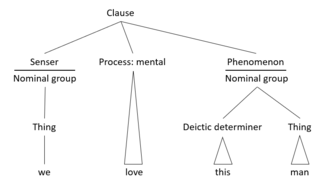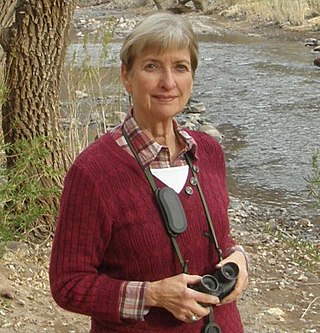Related Research Articles
Evolutionary linguistics or Darwinian linguistics is a sociobiological approach to the study of language. Evolutionary linguists consider linguistics as a subfield of sociobiology and evolutionary psychology. The approach is also closely linked with evolutionary anthropology, cognitive linguistics and biolinguistics. Studying languages as the products of nature, it is interested in the biological origin and development of language. Evolutionary linguistics is contrasted with humanistic approaches, especially structural linguistics.

Functional linguistics is an approach to the study of language characterized by taking systematically into account the speaker's and the hearer's side, and the communicative needs of the speaker and of the given language community. Linguistic functionalism spawned in the 1920s to 1930s from Ferdinand de Saussure's systematic structuralist approach to language (1916).
Principles and parameters is a framework within generative linguistics in which the syntax of a natural language is described in accordance with general principles and specific parameters that for particular languages are either turned on or off. For example, the position of heads in phrases is determined by a parameter. Whether a language is head-initial or head-final is regarded as a parameter which is either on or off for particular languages. Principles and parameters was largely formulated by the linguists Noam Chomsky and Howard Lasnik. Many linguists have worked within this framework, and for a period of time it was considered the dominant form of mainstream generative linguistics.
In historical linguistics, grammaticalization is a process of language change by which words representing objects and actions become grammatical markers. Thus it creates new function words from content words, rather than deriving them from existing bound, inflectional constructions. For example, the Old English verb willan 'to want', 'to wish' has become the Modern English auxiliary verb will, which expresses intention or simply futurity. Some concepts are often grammaticalized, while others, such as evidentiality, are not so much.
A discourse marker is a word or a phrase that plays a role in managing the flow and structure of discourse. Since their main function is at the level of discourse rather than at the level of utterances or sentences, discourse markers are relatively syntax-independent and usually do not change the truth conditional meaning of the sentence. They can also indicate what a speaker is doing on a variety of different planes. Examples of discourse markers include the particles oh, well, now, then, you know, and I mean, and the discourse connectives so, because, and, but, and or. The term discourse marker was popularized by Deborah Schiffrin in her 1987 book Discourse Markers.
Bernd Heine is a German linguist and specialist in African studies.
Langueandparole is a theoretical linguistic dichotomy distinguished by Ferdinand de Saussure in his Course in General Linguistics.
Peter W. Culicover is Professor of Linguistics at Ohio State University. He works in the areas of syntactic theory, language learnability and computational modelling of language acquisition and language change.

Joan Lea Bybee is an American linguist and professor emerita at the University of New Mexico. Much of her work concerns grammaticalization, stochastics, modality, morphology, and phonology. Bybee is best known for proposing the theory of usage-based phonology and for her contributions to cognitive and historical linguistics.
A genderless language is a natural or constructed language that has no distinctions of grammatical gender—that is, no categories requiring morphological agreement for gender between nouns and associated pronouns, adjectives, articles, or verbs.
In linguistics, andative and venitive are a type of verbal deixis: verb forms which indicate 'going' or 'coming' motion, respectively, in reference to a particular location or person. Other terms sometimes seen are itive and ventive, or translocative and cislocative. They generally derive historically from the verbs go and come being reduced to auxiliary verbs or verbal affixes, and may in turn be grammaticalized to aspectual morphemes. Many languages of Siberia, California, West Africa, the Caucasus-Mideast-North Africa, and Oceania have such verb forms.
Linguistics is the scientific study of language. The modern-day scientific study of linguistics takes all aspects of language into account — i.e., the cognitive, the social, the cultural, the psychological, the environmental, the biological, the literary, the grammatical, the paleographical, and the structural.
Elizabeth Closs Traugott is an American linguist and Professor Emerita of Linguistics and English, Stanford University. She is best known for her work on grammaticalization, subjectification, and constructionalization.
Nigel Vincent is a British linguist. He is Professor Emeritus of General and Romance Linguistics at the University of Manchester. He is best known for his work on morphology, syntax, and historical linguistics, with particular focus on the Romance languages.
Laurel J. Brinton is an American-born Canadian linguist.
Discourse Grammar (DG) is a grammatical framework that grew out of the analysis of spoken and written linguistic discourse on the one hand, and of work on parenthetical expressions, including Simon C. Dik's study of extra-clausal constituents, on the other. Initiated by Gunther Kaltenböck, Bernd Heine and Tania Kuteva, the framework is based on the distinction between two organizing principles of grammar where one concerns the structure of sentences and the other the linguistic organization beyond the sentence.
Thetical grammar forms one of the two domains of discourse grammar, the other domain being sentence grammar. The building blocks of thetical grammar are theticals, that is, linguistic expressions which are interpolated in, or juxtaposed to, clauses or sentences but syntactically, semantically and, typically, prosodically independent from these structures. The two domains are associated with contrasting principles of designing texts: Whereas sentence grammar is essentially restricted to the structure of sentences in a propositional format, thetical grammar concerns the overall contours of discourse beyond the sentence, thereby being responsible for a higher level of discourse production.
Cooptation is a cognitive-communicative operation whereby a piece of text, such as a clause, a phrase, a word, or any other unit, is inserted in a sentence. In the framework of Discourse Grammar, cooptation is understood as leading to the transfer of linguistic material from the domain of Sentence Grammar to that of Thetical Grammar.
Ans van Kemenade is a Dutch professor of English linguistics at the Radboud University Nijmegen specializing in the history of the English language.
References
- 1 2 3 "Kuteva, T." NIAS. Retrieved 5 November 2023.
- 1 2 3 4 5 6 "Tania Kouteva". Academia Europaea. Retrieved 5 November 2023.
- ↑ "Prof. Dr. Tania Kuteva". Heinrich-Heine-Universität Düsseldorf. Retrieved 5 November 2023.
- 1 2 "Prof. Dr. Tania Kouteva". Alexander von Humboldt Foundation. Retrieved 5 November 2023.
- ↑ Heine, Bernd; Kuteva, Tania; Hong, Bo; Long, Haiping; Narrog, Heiko; Rhee, Seongha (2019). World Lexicon of Grammaticalization (2 ed.). Cambridge: Cambridge University Press. ISBN 9781107136243.
- ↑ "Tania Kuteva". Google Scholar. Retrieved 5 November 2023.